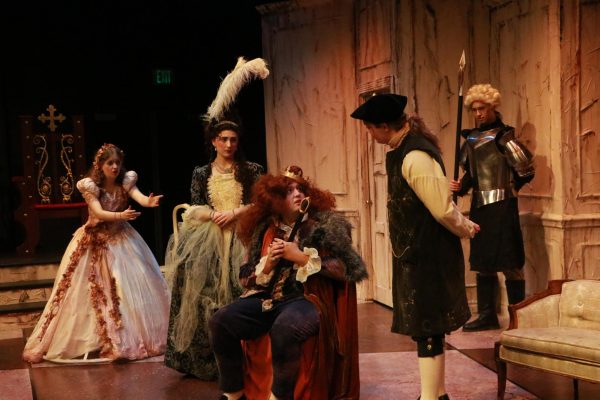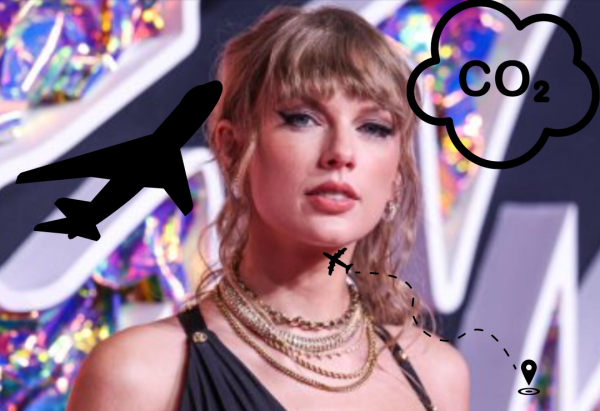The making of ‘Matilda’
With three weeks to go before opening night, five cast and crew members discuss their upcoming production.
Ava Neudeck performs “Naughty” from “Matilda” at a dress rehearsal on Oct. 31.
The 2021-2022 theater season brought to the stage “Pirates of Penzance,” “This Random World,” and the traditional “Shorts” performances. Following the conclusion of the season came the announcement of the first endeavor of the following year— “Matilda: The Musical.”
Following a lengthy process of preparation, auditioning, and callbacks, the cast list was announced, including juniors Ava Neudeck, Sofia Gomez, and Sophia Burden, and Evan McCreary, senior.
The crew is comprised of a number of students and staff members, with Annie Kaiser as director, and Gracie Faust, junior, as assistant stage manager.
Huddled in a cramped practice room surrounded by the sound of the ensemble cast rehearsal, Neudeck, Burden, Gomez, McCreary, and Faust discuss their love of “Matilda,” theater, and each other.
[Lily Gottschling]: What goes into preparing for an audition?
[Sophia Burden]: I basically look through the materials they post [or] I look through my audition book and I find the character that resonates with me the most. And that’s usually what I choose to audition with. I feel if you’re playing a character that you don’t feel connected to then that’s a bit strange.
[Sofia Gomez]: I never try to memorize anything just because I want it to be like a very raw interpretation of a character.
[Ava Neudeck]: If it’s a show that I’m not too familiar with, I would read the backstory of the show as a whole before going into the audition or even like looking at the audition material.
[Evan McCreary]: After familiarizing myself with the show and watching as many productions of it as I can to kind of get a feel for the show and for the characters, what’s most important for me is taking the character that I want to audition for and making it my own. [I] develop that character through analysis and then just bring that into the audition room.
[LG]: And then for the crew, how do you guys prepare? I assume it’s different.
[Gracie Faust]: Yes, very different onstage. The [stage] manager and assistant stage manager run auditions. It’s mostly mentally preparing yourself because it can be a lot. I didn’t know what to expect going in.
[LG]: So [McCreary], because you’re a senior, how are you going into this as your last musical?
[EM]: There’s definitely that kind of dark cloud that hangs above knowing that this is the last musical but for me. Really the only way for me to get through it is to not think about that at all and not let that distract me because with who I am as a performer, knowing that this is like the last opportunity or whatever it’s going to stress me out way too much. And I feel like I’m at my best when I’m performing without the stress when I can fully immerse myself into the character and not let anything get in the way.
[LG]: For [Neudeck], is this your first time kind in like that starring role position?
[AN]: Yeah. I had more of a featured role last year but like it wasn’t a main character. This is my first big lead role in high school. It’s been very fun.
[LG]: And then for all of you, how is this different from other experiences that you’ve had inside and outside of high school?
[SB]: It’s very organized.
[GF]: [Kaiser] runs a tight ship.
[Collective laughter]
[GF]: I appreciate it though.
[SB]: I appreciate the structure of the whole thing because we know exactly when we are needed, and what we’re going to be working on. I just love how organized it is.
[SG]: Yeah, we have a whole spreadsheet and it’s just so nice to have that structure because a lot of the time I feel like it’s a very common theme for a lot of artistic people. It’s very exciting because it’ll be a very clean show.
[LG]: Other than everyone in this room, who else is kind of like really helping to make this all happen?
[SG] and [SB]: [Katie] Simmons.
[SB]: [Simmons] is the choir teacher that is filling in for [Aubrey Patterson] as she’s on maternity leave. Yeah. And Simmons is doing an amazing job. I mean, like, they are learning all this music, the teaching it so quickly.
[AN]: And they’re teaching, like five different choirs during the day as well.
[SB]: They’re killing it.
[AN]: And then the other big ones [are Kaiser], the director, and [Jon Ares].
[GF]: [Ares] is the tech director for the school, so he’s in charge of all the technicians [and] he does the lighting.
[SG]: And [Steve Beckingham] did the poster.
[LG]: Wow, you guys all interact really well with each other and seem just very comfortable with each other. What’s the bonding process? Because obviously, if you’re on stage and everything it can be very vulnerable for some people.
[EM]: For me personally, being vulnerable is a very hard thing to do. There’s kind of this wall that I know that I put up around myself as protection because there’s been a lot of unpleasant experiences in my school experience, but I feel like for whatever magical and mysterious reason, that all goes away when you’re on stage. You’re forced to be vulnerable with people and I think being in that state with everyone who shares a passion for something and everyone has this common goal to create this beautiful piece of art that you want to share with the world, it does bond you almost automatically. It almost takes no effort, you know?
[AN]: I feel like that’s one of the reasons why I love the rehearsal process so much because not only are you like learning the show but [you’re] creating relationships, you also create those relationships and become like one big family and you know. There were people in the cast that I’d never met before and now I talk to them, like every day, and it’s just a great community. I also feel like there’s just like this bond that theater kids naturally have.
[GF]: Yeah, like they gravitate toward each other. You have all these people you can just be yourself with. It’s so wonderful.
[LG]: Wow, these answers are all so sweet. Do any of you want to ask each other questions? Or anything you want to add?
[SB to GF]: I like your earrings.
[Collective laughter]
[GF]: They’re little witches.
[SB]: Oh my gosh, I love it.
[EM]: I have a question for everyone. How is theater changed your life?
[AN]: Oh my gosh.
[SG]: Goodness [McCreary].
[AN]: Well, I can start I guess. So I saw my first show when I was three. I [had] just moved to Oregon, and I still don’t know the show, but I know is with the Oregon Children’s Theater and we sat on the balcony. Something pierced me and I knew immediately that’s what I wanted to do. It’s so crazy because we used to come to these shows with the high school every year, and I would always just be in such awe of those actors and now to be one of those people doing the shows [is] just so full circle.
[SB]: Well, I guess I wanted to do theater when I was like six after I did like my primary school’s “Three Piggy Opera.”
[Collective laughter]
[SB]: And I was like, ‘You know what, I’m gonna be a theater kid.’ [Then] in middle school, I decided to, you know, branch out [and] do theater again. And we know how that turned out.
[SG]: [Burden is] always making me cry. [Laughs].
[SB]: Aw.
[SG]: Anyway, I feel like the biggest thing that I’ve gained is t confidence. I feel like when you have to get up on stage in front of a lot of people it can it’s just it’s so like, I don’t know, it’s really just like life-changing because you feel like you can be vulnerable and you can put out something that you’ve been working really hard on. And people you know, oftentimes appreciate it and they find a lot of joy in it. When you’re bringing other people that joy, it’s really rewarding.
[AN]: There’s nothing like that feeling of being on stage and the lights are just blinding you and you can’t even see the audience, and you’re just in the costume, in the moment. I feel like oh like I definitely [took] theater for granted before COVID[-19], and then not having that made me want it even more.
[GF]: I’ve been involved in theater since I was like eight and I did like the Missoula Children’s Theater.
[Collective gasps]
[AN]: I did those too!
[SG]: I’m obsessed with that.
[GF]: But once I got to [the] middle school musical, [I] connected with a lot of people. I mean, I was acting them [and] was not a huge fan, but [then] I realized that I had the option to be engaged in this thing that I loved so much and not have to be on stage. Now, like, I get to show up and I get to just do my thing and it’s great and get to really appreciate it more.
[LG]: [McCreary] do you want to answer your own question?
[SG]: Yeah let’s hear it!
[EM]: Yeah, for me, theater has been like this way of being able to become more confident in who I am as a person because that’s something that I’ve always struggled with personally. It’s, it’s weird, it’s like by playing characters I’m able to discover things about myself and kind of find out my place in the world. It was my sophomore year that I kind of discovered this ability to be able to use theater to foster change and because that’s something I’m passionate about, I kind of tied theater and activism together and I was able to perform pieces that I felt not only inspired people but also may have inspired change. I think that when you make people feel something, it’s the greatest feeling in the world. Being on the precipice of adulthood as a senior and thinking about all these decisions, you know, ‘Where do I go next? What do I want to do?’ Really, there’s nothing else in the world except maybe my dog that brings me as much joy as theater does and it’s what I want to spend every day of the rest of my life doing.
[SG]: You’re literally the Beyonce of West Linn High School.
[EM]: Can I be Lady Gaga?
[SG]: You can be whatever you want to be.
[Collective laughter]
For more on Evan McCreary, click the link to read the latest edition of the Amplifier news magazine.
Your donation will support the student journalists of West Linn High School. Your contribution will allow us to continue to produce quality content by purchasing equipment, software, and continuing to host our website on School Newspapers Online (SNO).
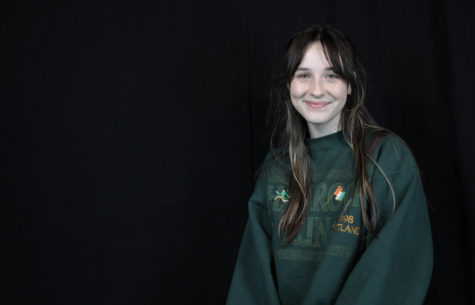
Lily Gottschling, senior, is the Copy Editor-in-Chief for wlhsNOW.com. She loves writing reviews, features, and opinions. She is also a co-host of the...


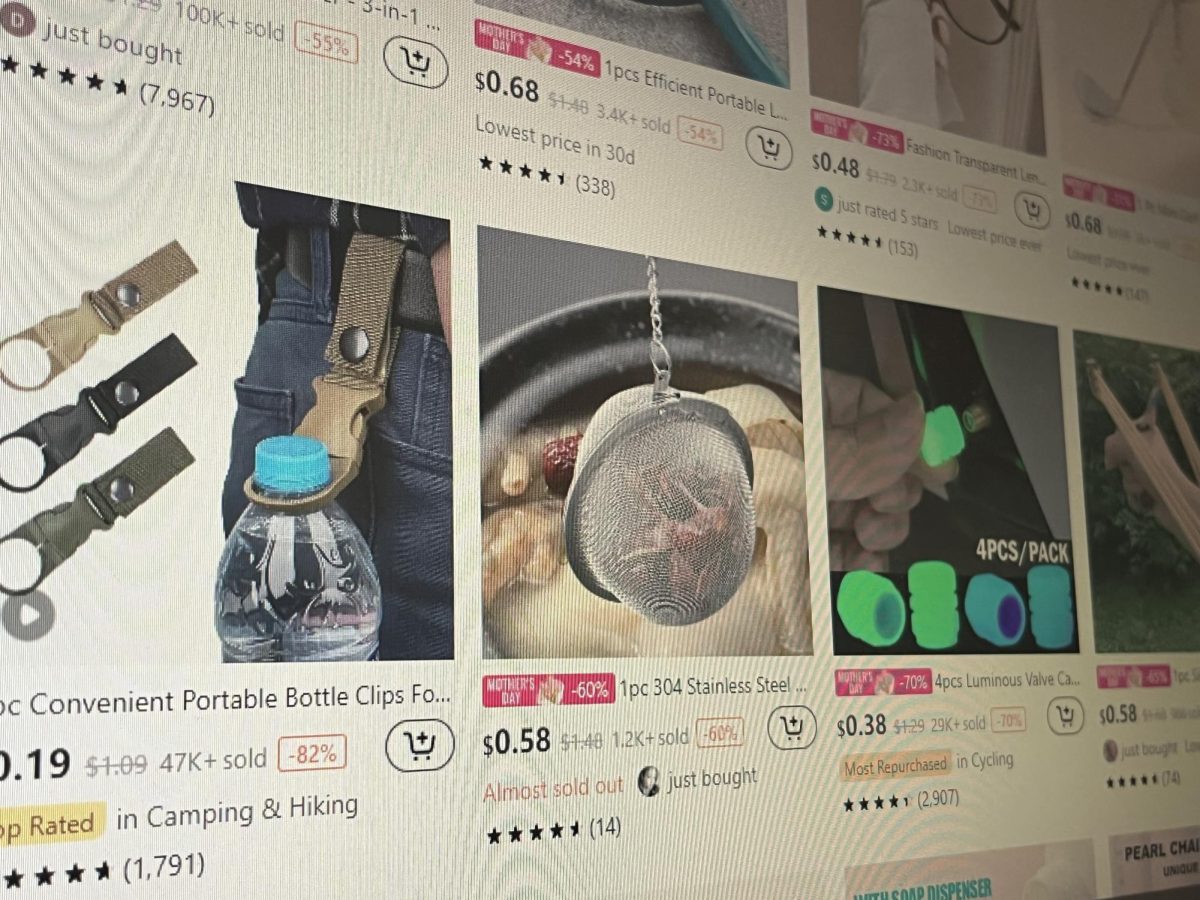























![Game, set, and match. Corbin Atchley, sophomore, high fives Sanam Sidhu, freshman, after a rally with other club members. “I just joined [the club],” Sidhu said. “[I heard about it] on Instagram, they always post about it, I’ve been wanting to come. My parents used to play [net sports] too and they taught us, and then I learned from my brother.”](https://wlhsnow.com/wp-content/uploads/2024/03/MG_7715-2-1200x800.jpg)





![The teams prepare to start another play with just a few minutes left in the first half. The Lions were in the lead at halftime with a score of 27-0. At half time, the team went back to the locker rooms. “[We ate] orange slices,” Malos said. “[Then] our team came out and got the win.”](https://wlhsnow.com/wp-content/uploads/2023/10/IMG_2385-1200x800.jpg)





![At the bottom of the third inning, the Lions are still scoreless. Rowe stands at home plate, preparing to bat, while Vandenbrink stands off to the side as the next batter up. Despite having the bases loaded, the team was unable to score any runs. “It’s just the beginning of the season. We’re just going to be playing out best by June, [and] that’s where champions are,” Rowe said.](https://wlhsnow.com/wp-content/uploads/2024/03/IMG_3077-1200x900.jpg)



































































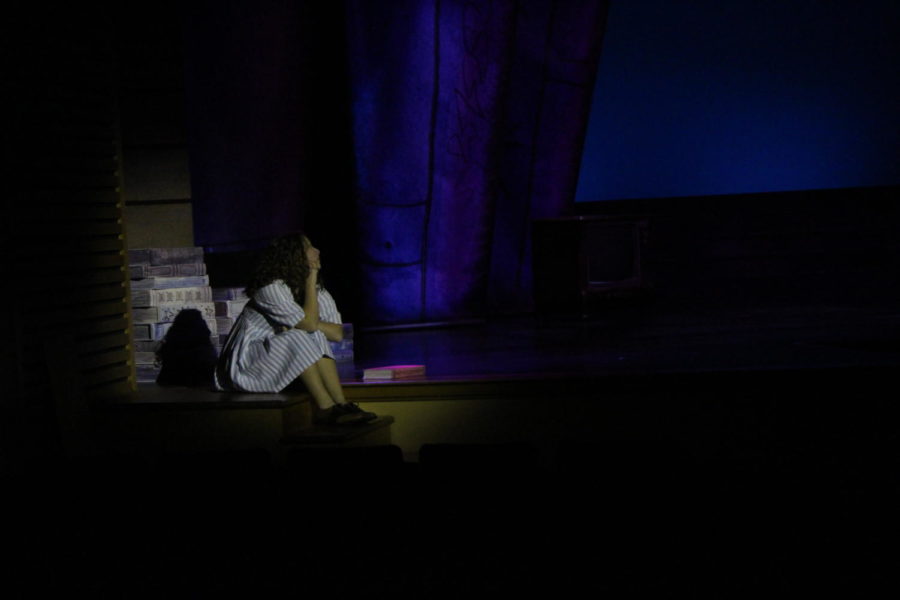

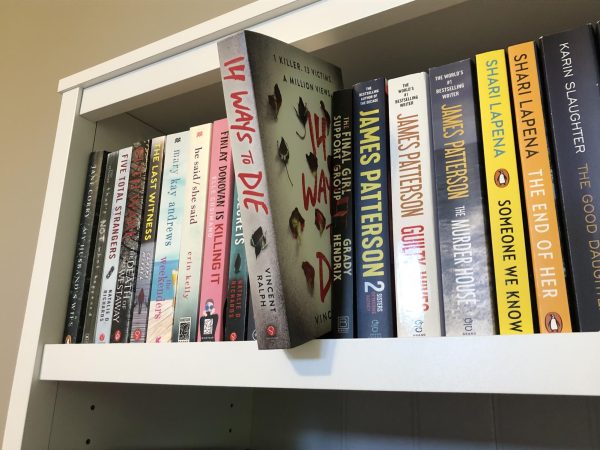
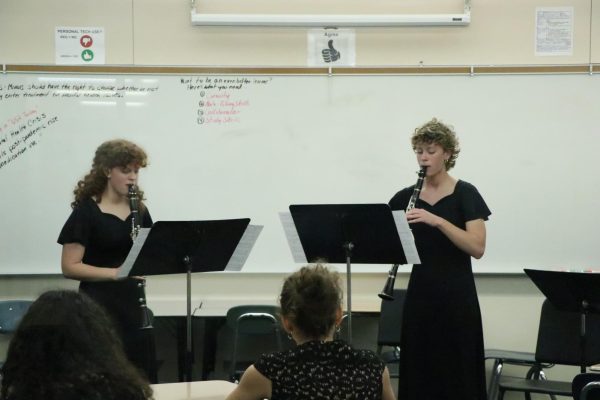
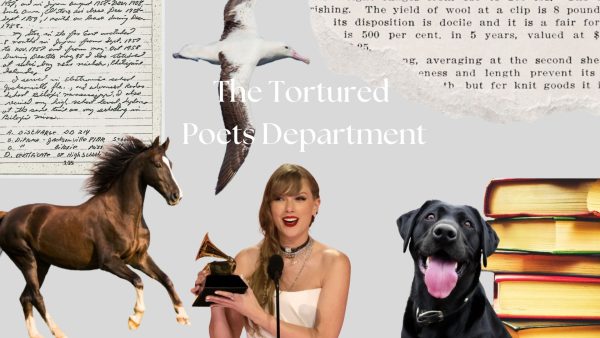

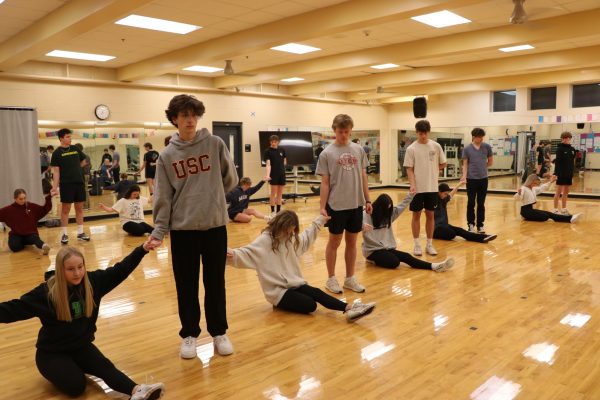
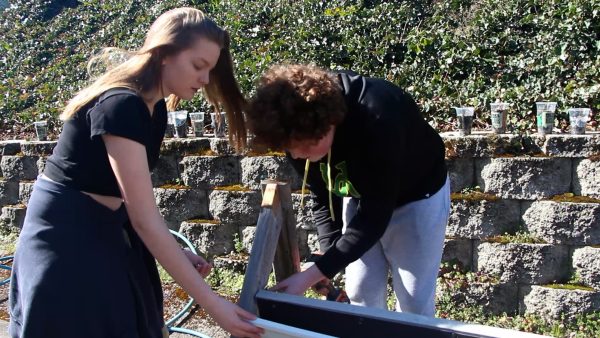
![Game, set, and match. Corbin Atchley, sophomore, high fives Sanam Sidhu, freshman, after a rally with other club members. “I just joined [the club],” Sidhu said. “[I heard about it] on Instagram, they always post about it, I’ve been wanting to come. My parents used to play [net sports] too and they taught us, and then I learned from my brother.”](https://wlhsnow.com/wp-content/uploads/2024/03/MG_7715-2-600x400.jpg)
